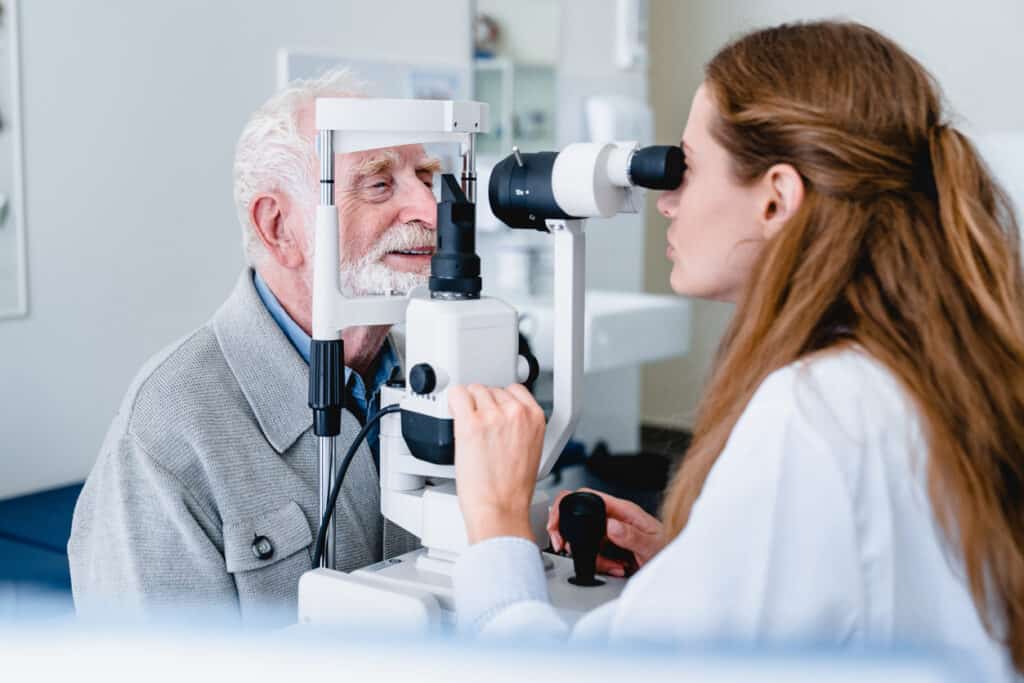It’s natural to want to maintain independent living as we age. But issues like vision impairment can make living alone dangerous, if not impossible, for many seniors. One of the most common causes of the loss of independence is Age-Related Macular Degeneration (AMD), a condition that affects almost 20 million Americans. But what is this ailment, and how will it impact a person’s quality of life? To answer those questions, let’s take a look at this condition, its prognosis, and why assisted living with vision impairment may be the right choice for people living with AMD or other forms of vision loss.
What Is Age-Related Macular Degeneration?
AMD is a progressive eye disease that can cause vision loss. It results from damage to the macula, the part of the eye that controls straight-ahead vision. This damage can have multiple causes, and as the name suggests, it almost always develops in older adults. There are two types of AMD, colloquially called “dry” and “wet” AMD. Dry AMD is officially known as atrophic AMD. It accounts for about 90% of all cases. Dry AMD develops when small protein deposits form under the macula. The deposits cause the delicate macula to dry out and thin over time. Vision loss with dry AMD is often gradual. It may take patients time to appreciate that they’re experiencing vision loss. Left untreated, dry AMD can progress to wet AMD. Also known as advanced neovascular AMD, this condition is more serious and less common. When it does occur, wet AMD can result in rapid vision loss. It’s caused by abnormal blood vessels that grow in the back of the eye and damage the macula.
What Are the Signs of AMD?
The symptoms of AMD will vary depending on which type a person has and how advanced the case is. Early dry AMD may have no symptoms. As the disease progresses, an individual may notice some mild blurriness. Difficulty seeing in low lighting is also common. In late AMD (wet or dry type), straight lines may start to look distorted. The center of a person’s vision may blur further, or they might have blank spots in their field of vision. Colors may seem less bright than before. Their low-light vision may continue to degrade. In rare cases, a person may lose their sight completely.
Can AMD Be Cured?
There is no cure for either form of AMD at this time. Treatment focuses on slowing down the progression of the disease and preventing as much vision loss as possible. For example, dietary supplements can help preserve a patient’s eye health, slowing or even stopping degeneration. Photodynamic therapy may also help treat wet AMD by targeting the abnormal blood vessels that damage the eyes. And, although the treatment is still in its early development, there’s hope that stem cell therapy may help treat or even reverse AMD in the future.
Who Is at Risk?
Anyone can develop AMD, but advanced age is the number-one predictor. It’s uncommon for people under the age of 50 to suffer from macular degeneration. That said, several risk factors can increase your likelihood of developing the disease as you age. Some, like genetics, are not in our control. If you have a family history of AMD, you should be advised that you have a higher chance of developing the disease yourself. These individuals might take proactive steps to preserve their eye health as much as possible. High blood pressure is another common risk factor. Smoking, obesity, and diets high in saturated fats all contribute to high blood pressure, so people worried about AMD should make lifestyle choices accordingly. Excessive exposure to ultraviolet rays can also contribute to AMD, as well as cataracts and other eye issues. Everyone, regardless of their other risk factors, should wear eye protection when they’re out during the day.
How Does Vision Impairment Affect Quality of Life?
Someone doesn’t need to experience total loss of eyesight for vision loss to affect their day-to-day life. Even mild cases can make it more difficult and dangerous to run regular errands. As vision loss progresses, household tasks like cooking and cleaning can become difficult. There’s also evidence to suggest a link between vision impairment and an increased risk of developing dementia. Vision impairment is associated with at least 100,000 cases of dementia in the United States. Researchers think that this is because vision loss causes shifts in brain function and structure that are similar to those seen in dementia. To make matters worse, the loss of vision may cause some older adults to become withdrawn and stop participating in routines or social activities. These behaviors are themselves thought to be risk factors for dementia.
The Benefits of Assisted Living With Vision Impairment
While there is no cure for AMD, senior care solutions can help maintain a person’s health and quality of life. Blind seniors, for example, benefit from specialty care that’s designed to meet their needs. By working with care providers, these residents can find a living arrangement that tends to their welfare while allowing them to retain as much independence as possible. Senior care can also play a role in slowing the progression of conditions like AMD. As we mentioned above, diet has a significant effect on an AMD patient’s prognosis. Avoiding conditions like obesity and high blood pressure while eating a nutritious diet can help an individual manage their AMD. The fellowship that comes with living in a senior community shouldn’t be overlooked, either. Sensory loss contributes to the feeling of isolation that many independent seniors already feel. Living near peers who have similar ages and life experiences can stave off the feelings of loneliness, depression, and anxiety that are only exacerbated by vision loss.
Find Age-Related Macular Degeneration Assisted Living Solutions
As much as we all treasure our independence, loss of eyesight can make living alone unfeasible for many seniors. That’s why at Inspired Living, we strive to create supportive, comfortable communities for all of our residents. By doing so, we can help seniors live on their own terms while making sure their unique needs are met. If it’s time for you or a loved one to consider assisted living with vision impairment, then don’t wait any longer. Contact us today to explore options for this next life chapter.




